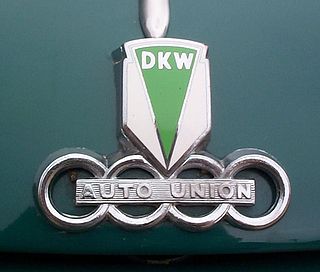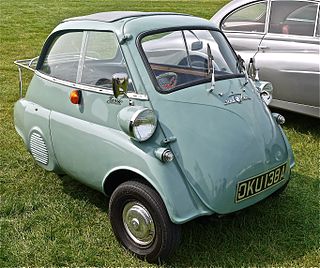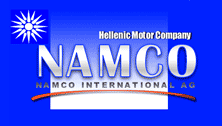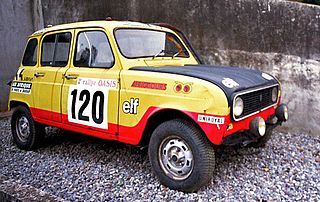
Egg or Egg & Egli was a Swiss car made in business from 1896 to 1919. It was one of the more long-lived early Swiss car makes. It appeared at numerous auto shows and competed in France's annual smash-up derby.

Egg or Egg & Egli was a Swiss car made in business from 1896 to 1919. It was one of the more long-lived early Swiss car makes. It appeared at numerous auto shows and competed in France's annual smash-up derby.
Rudolf Egg, an automotive engineer, built a car for his own use in 1893. He later founded the namesake company in 1896 in Zürich with funds from a Swiss banker called Egli. In 1904, the company moved to Wollishofen, operating under the name Motorwagenfabrik Excelsior. Egg's company later produced some of the first Swiss aircraft engines. Financial difficulties after the war forced the closure of the business in 1919. Egg himself later became a Renault dealer.
At the outset, all models were three-wheelers. Called Egg & Egli Tricycle before 1900, later three-wheelers were marketed as Egg & Egli Rapid. The first four-wheeled cars were produced in 1899, with a heavy resemblance to the Oldsmobile Curved Dash. Egg models were regarded as high-quality in Switzerland, and many Swiss companies produced them under license.

DKW was a German car and motorcycle marque. DKW was one of the four companies that formed Auto Union in 1932 and is hence an ancestor of the modern day Audi company.

Peugeot is a French brand of automobiles owned by Stellantis.

AC Cars, originally incorporated as Auto Carriers Ltd., is a British specialist automobile manufacturer and one of the oldest independent car makers founded in Britain. As a result of bad financial conditions over the years, the company was renamed or liquidated many times until its present form. In 2022, the new corporate structure began the production of new AC Cobra models, with a slightly modified structure to adapt it to modern safety and technology requirements and obtain the European road homologation certificate

Reliant Motor Company was a British car manufacturer based in Tamworth, Staffordshire, England. It was founded in 1935 and ended car production in 2002, the company had been known as "Reliant Motor Company" until the 1990s when it became "Reliant Motors" and then finally became "Reliant cars LTD" after production had ended of the Robin as the company was restructured to be a car import business. It's now a dormant company and the only entity left is a separate parts company created called Reliant Partsworld who produce parts for Reliant vehicles.

Riley was a British motorcar and bicycle manufacturer from 1890. Riley became part of the Nuffield Organization in 1938 and was merged into the British Leyland Motor Corporation in 1968. In July 1969 British Leyland announced the immediate end of Riley production, although 1969 was a difficult year for the UK automotive industry and many cars from Riley's inventory may have been first registered in 1970.

The Isetta is an Italian-designed microcar built under license in a number of different countries, including Argentina, Spain, Belgium, France, Brazil, Germany, and the United Kingdom. Because of its egg shape and bubble-like windows, it became known as a bubble car, a name also given to other similar vehicles.
Alvis Car and Engineering Company Ltd was a British manufacturing company in Coventry from 1919 to 1967. In addition to automobiles designed for the civilian market, the company also produced racing cars, aircraft engines, armoured cars and other armoured fighting vehicles.

The Four Wheel Drive Auto Company, more often known as Four Wheel Drive (4WD), was a pioneering American company that developed and produced all-wheel drive vehicles. It was founded in 1909 in Clintonville, Wisconsin, as the Badger Four-Wheel Drive Auto Company by Otto Zachow and William Besserdich. The first production facility was built in 1911 and was designed by architect Wallace W. DeLong of Appleton, Wisconsin.

Humber Limited was a British manufacturer of bicycles, motorcycles and motor vehicles incorporated and listed on the stock exchange in 1887. It took the name Humber & Co Limited because of the high reputation of the products of one of the constituent businesses that had belonged to Thomas Humber. A financial reconstruction in 1899 transferred its business to Humber Limited.

Motobécane was a French manufacturer of bicycles, mopeds, motorcycles, and other small vehicles, established in 1923. "Motobécane" is a compound of "moto", short for motorcycle; "bécane" is slang for "bike."

Excelsior, based in Coventry, was a British bicycle, motorcycle and car maker. They were Britain’s first motorcycle manufacturer, starting production of their own ‘motor-bicycle’ in 1896. Initially they had premises at Lower Ford Street, Coventry, and 287-295 Stoney Stanton Road, Hillfields, Coventry, Warwickshire before moving to Kings Road, Tyseley, Birmingham in 1921.

Development of the automobile started in 1672 with the invention of the first steam-powered vehicle, which led to the creation of the first steam-powered automobile capable of human transportation, built by Nicolas-Joseph Cugnot in 1769. Inventors began to branch out at the start of the 19th century, creating the de Rivas engine, one of the first internal combustion engines, and an early electric motor. Samuel Brown later tested the first industrially applied internal combustion engine in 1826.

Vincent Motorcycles was a British manufacturer of motorcycles from 1928 to 1955. The business was established by Philip Vincent who bought an existing manufacturing name HRD, initially renaming it as Vincent HRD, producing his own motorcycles as HRD did previously with engines purchased as complete assemblies from other companies. From 1934, two new engines were developed as single cylinder in 500 cc and v-twin 1,000 cc capacities. Production grew from 1936, with the most-famous models being developed from the original designs after the War period in the late 1940s.
Daimler-Motoren-Gesellschaft was a German engineering company and later automobile manufacturer, in operation from 1890 until 1926. Founded by Gottlieb Daimler and Wilhelm Maybach, it was based first in Cannstatt. Daimler died in 1900, and their business moved in 1903 to Stuttgart-Untertürkheim after the original factory was destroyed by fire, and again to Berlin in 1922. Other factories were located in Marienfelde and Sindelfingen.

Brennabor-Werke AG was a German manufacturer of infant buggies, bicycles, motorcycles and, for two decades, of powered motor vehicles. It was based in Brandenburg an der Havel and operated between 1871 and 1945.

Léon Bollée Automobiles was a French company founded by Léon Bollée in Le Mans to build a first vehicle called "Voiturette".

NAMCO is a Greek vehicle manufacturer. It was founded in 1972 by Kontogouris brothers.

Sinpar was a French automobile company which was founded in 1946 by Léon Demeester.

In 2015 Spain produced 2.7 million cars which made it the 8th largest automobile producer country in the world and the 2nd largest car manufacturer in Europe after Germany. The forecast as of 2016 was to produce a total of 2.8 million vehicles from which about 80% is for export. During the first half of 2016, with exports valued over 24 billion euros over that period, the automotive industry accounted for 18.9% of the total Spanish exports.

Willys was a brand name used by Willys–Overland Motors, an American automobile company, founded by John North Willys. It was best known for its design and production of World War II era and later military jeeps (MBs), as well as civilian versions, and branding the 'jeep' military slang-word into the '(Universal) Jeep' marque, during the 20th century.